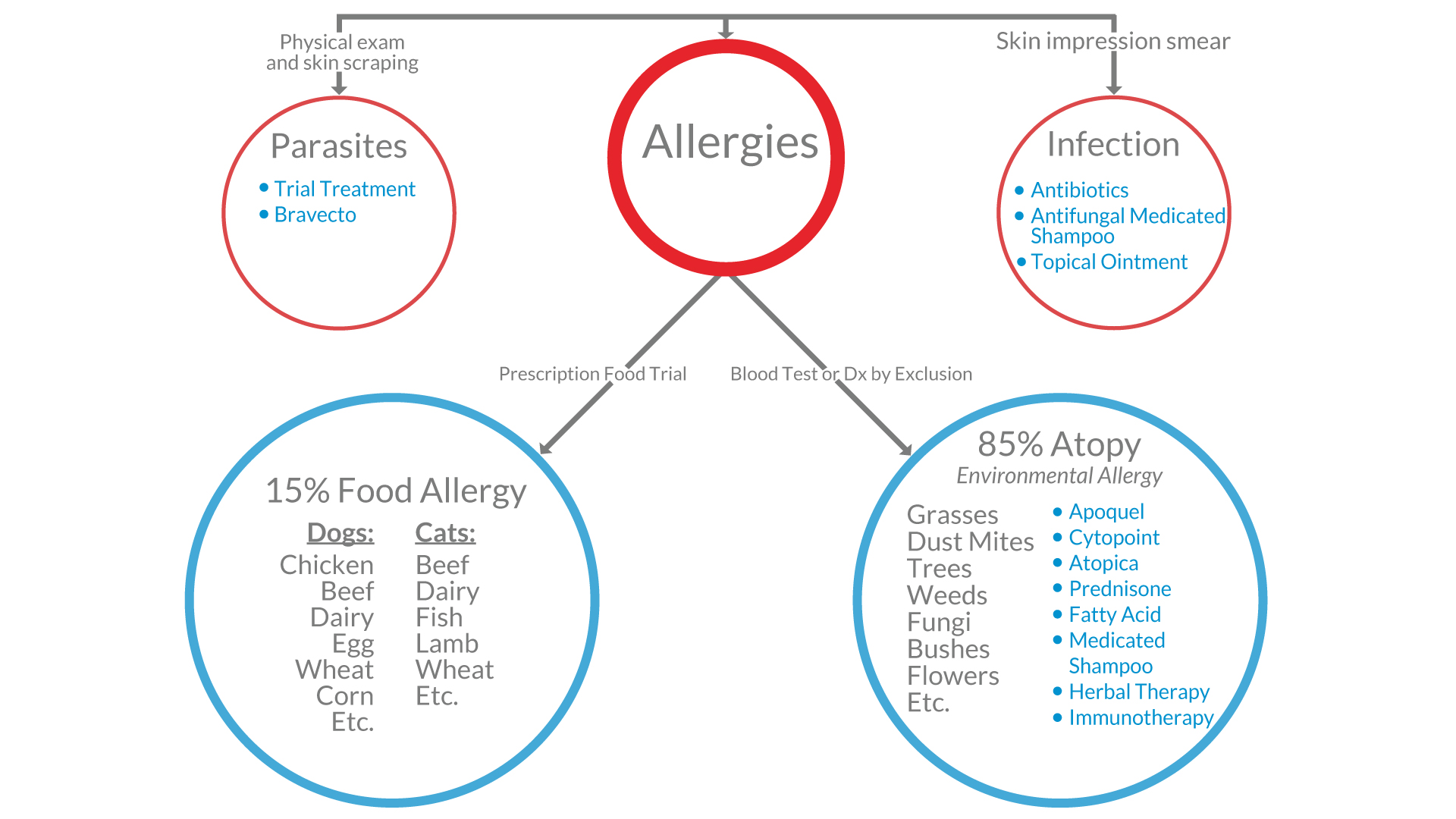The most common disease we diagnose at Intermountain Pet Hospital is dental disease, but now we're going to talk about the second most common condition that we see in our hospital: Itchy pets.
Three main causes that make pets itchy
The easiest way to address that is a diagram. Below is a diagram that outlines the three leading things that make a pet itch excessively: Parasites, allergies, and infection.

The thing that we want to stress is if you address an allergy but not address an infection, the dog or cat will continue to be itchy. If you address an infection but not the parasite, the pet will continue to be itchy. The key is to review and address all three of the main causes.
Parasites
Several kinds of parasites can make dogs or cats itchy. They can be mites, fleas, lice, and sometimes ticks. Anyone or all of those can make a dog itchy.
Fortunately, parasites are very easy to treat. Currently, there are several different types of medications. The first one we try for dogs is called Bravecto. This medication is a chewable tablet that lasts three months and will kill external parasites. If any new parasites come in contact with your dog during those three months, they will die as well. Since Bravecto is so simple to administer, we generally will recommend this first so we can take parasites off the table. It's important to note that it only takes one flea, mite, or tick to make a dog itchy, especially if they have hypersensitivity or an allergy to it.
For cats, we use Revolution. This is a topical ointment that goes on the back of the cat’s neck instead of an oral pill. It is safe for cats because they do not have the ability to lick it off. Again, we generally like to rule out parasites first.
Allergies
The biggest circle is allergies, and that is because it's the most common. You'll see there are two main reasons, food allergies, and atopy (environmental) allergies.
The most common allergy is atopy. 85 percent of the time if a pet has an allergy, it's environmental, not a food allergy. These environmental allergies include grasses, trees, fungi, flowers, and much more. These types of allergies may only present themselves seasonally. It's always a good idea to start a diary of when your pet is excessively itching throughout the day, week, and month.
Only 15 percent of allergies are food related. That's why we don't recommend a pet-parent go to a feed store to ask for recommendations. If you get a less-than-honest person, they will want to sell you several hundred dollars' worth of food to try and fix your pet's problem. We cannot stress enough that only about 15 percent of pets have food-based allergies.
If it does happen to be either atopy or food allergy, often, there is no cure. We then have to talk about long-term treatment. We'll address atopic allergies in a later blog.
Infections
There are several types of infections that a pet can have that cause excessive itching. They can have a bacterial infection, or they can have a fungal infection on the skin. To diagnose this, we do a skin impression smear, (cytology.) If there is an infection, we have to address it either with antibiotics, anti-fungal medication, a medicated shampoo, or topical medication. Those are all ways to treat an infection.
The key to remember is that if you address the infection, but you don't address the reason why a dog or cat has an infection; they will continue to be itchy and vice versa. If you address an allergy and/or parasite, but you don't address an infection, your pet will continue to be itchy. You want to make sure that we're covering all of the bases: parasites, allergies, and infection.
Those are the three main reasons why a pet can be itchy. Treatment options are going to vary depending on how bad the itching is and which one of the issues is the cause. If you have concerns on whether your pet is excessively itching, schedule a consult with your veterinarian on what options are available for your pet.


